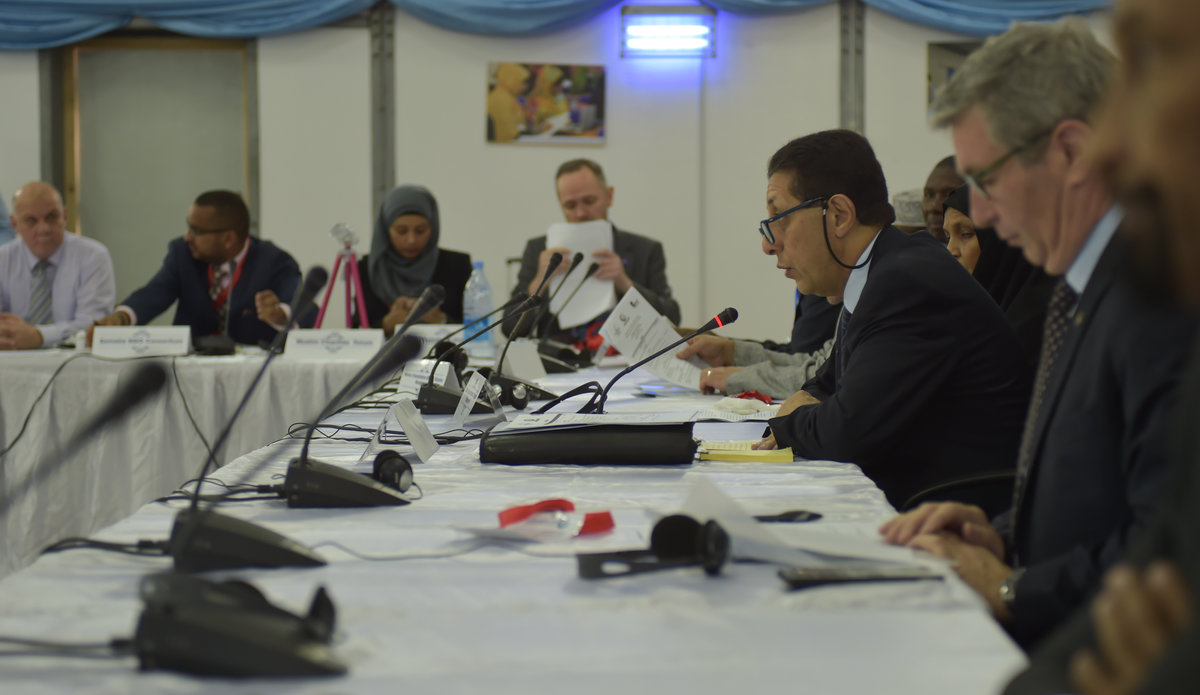Organisation of Islamic Cooperation and Muslim Charities Forum meet International partners to scale up relief assistance to victims of drought
Humanitarian partners involved in efforts to address the current drought crisis in Somalia, held a meeting Tuesday to discuss ways of strengthening partnerships to better deliver assistance to affected communities.
The roundtable meeting organised by the Organisation of Islamic Cooperation (OIC). the Humanitarian Forum and the Muslim Charities Forum, focused on the prevention of famine in Somalia which threatens to affect millions of vulnerable people.
The meeting was also attended by key stakeholders, including local Islamic and non-Islamic charities, national and international NGOs, United Nations and the Federal Government of Somalia.
During the meeting, the officials also took stock of the scale-up of humanitarian assistance and steps to be taken to accelerate timely and coordinated response to prevent famine
The Humanitarian Coordinator for Somalia, Peter de Clercq, said more than 500,000 of the most vulnerable people have been displaced since the drought began, noting that Somalia is already grappling with 1.1 million internally displaced persons (IDPs) and that the number could rise to two million by the end of 2017.
De Clercq noted that the international community has donated $558 million to cover about 70 percent of the required needs of about 5.5 million people for six months. He noted that the appeal by the UN Secretary-General, Antonio Guterres, during his visit to Baidoa last cannot be overstated.
“From the information we have, the drought is not going to be over by September. We are looking at another rainy season that is likely to fail. Therefore we will need another operation in the second half of this year, of which we are putting together additional needs. So, this is not just a reflection of how serious the situation is, but it is also a sign of confidence in our ability as a humanitarian system to collectively scale up here in Somalia,” said de Clercq.
Presently, there are ongoing interventions to provide safe water, food, nutrition to malnourished children and treatment of livestock. However, projections by humanitarian organizations indicate a likely increase in acute diarrhea and cholera, measles and human displacement, which calls for significant scale up of interventions to save lives.
According to the latest report by the United Nations Office for the Coordination of Humanitarian Affairs (UNOCHA) drought-related displacement continues to rise exponentially and regions with the highest arrivals include Baidoa, Mogadishu, Sool and Sanaag.
De Clercq hailed the OIC and Islamic charities working to avert a crisis in Somalia where more than half the population needs assistance.
“We very much appreciate the role of Islamic charities in that respect because they have different channels of fundraising. But they also have a much stronger link with the local communities and are able to get assistance into remote places that for us as UN and NGOs on the international side, is often much more difficult to do,” de Clercq said.
Somalia’s Federal Minister of Humanitarian Affairs and Disaster Management, Mariam Qasim, noted that prolonged conflict has eroded the communal disaster and risk reduction measures which traditionally enabled pastoral communities to cope with drought situations.
“The situation is deteriorating fast and we need to urgently and aggressively scale up services to prevent further deaths. We must reach displaced populations and we must also reach those still remaining in rural areas to prevent further displacement,” Minister Mariam observed.
She revealed the Federal Government of Somalia will on 19th April, launch a National Emergency Operations Centre. The Federal Government, the Minister added, is working with UNOCHA to ensure delivery of aid to regions and effectiveness of humanitarian operations in the country.
Ambassador Hesham Youssef, the OIC Assistant Secretary-General for Humanitarian Affairs, said the agency is presently supporting efforts to coordinate humanitarian assistance from OIC member states and from Islamic NGOs to respond to the drought in Somalia.
“We hope to be able to continue our role as coordinator; and also our role as provider of humanitarian assistance. But the main role is advocacy and support to the people of Somalia,” said Ambassador Youssef.
 UN
UN





